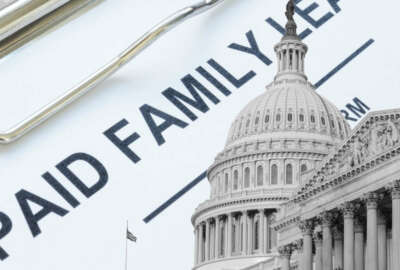
House Democrats call for retroactive expansion of paid parental leave to federal employees
In a letter to House leadership, a group of congressional Democrats said new paid parental leave benefits should extend to federal employees who recently had or...
House Democrats are calling on congressional leaders to expand the new paid parental leave law to cover federal employees who had or are expecting a new child this year before the upcoming implementation date.
New paid parental leave benefits under the Federal Employee Paid Leave Act (FEPLA) are supposed to be available starting Oct. 1.
But House Democrats say that start date “leaves out tens of thousands of federal workers” who are expecting a new child now or have recently welcomed a new child earlier this year.
“We respectfully ask that you work with us to extend paid parental leave coverage to all covered and eligible federal workers in connection with a birth, adoption or foster care placement of a child that occurs between Dec. 20, 2019, and Oct. 1, 2020,” the members wrote in a May 8 letter to House Speaker Nancy Pelosi (D-Calif.) and Minority Speaker Kevin McCarthy (R-Calif.). “This would guarantee that all federal workers covered by the Family and Medical Leave Act would be able to properly care for their newborn or newly adopted children.”
Rep. Jamie Raskin (D-Md.), along with House Oversight and Reform Committee Chairman Carolyn Maloney (D-N.Y.) , Rep. Gerry Connolly (D-Va.) and District of Columbia Del. Eleanor Holmes Norton, led eight of their colleagues in writing to congressional leaders.
The president signed FEPLA into law with much fanfare at the end of 2019. The law, which was highly lauded as a “historic” achievement, provides up to 12 weeks of paid parental leave to federal employees.
“It may seem like a small thing as we enact trillion-dollar relief packages, but in this public health crisis, all affected federal workers should be able to take advantage of our new paid parental leave policy,” the members wrote.
Raskin and his colleagues said they have heard from their constituents in this situation. Federal News Network has also received dozens of emails and questions earlier this year from federal employees who have described similar scenarios.
“We have heard recently from numerous pregnant federal workers who face an array of complex challenges, like not being able to count on family and friends for child care assistance because of social distancing, not being able to find safe and appropriate paid child care in the crisis, and navigating difficult or cancelled doctor visits,” the members wrote. “Let us give these people the same support we are offering their colleagues.”
It’s unclear how federal employees who had a new child earlier this year might retroactively receive paid parental leave benefits.
The Office of Personnel Management is expected to publish draft regulations on the implementation of the paid parental leave law in late spring, the agency has said. Only then will the public have an opportunity to read and comment on the benefits and their implementation.
The new benefits will be ready at the congressional deadline, OPM assured at least one employee union back in early March.
Meantime, other problems with the current paid parental leave law haven’t been resolved. The law inadvertently left out some factions of the federal workforce, including much of the Federal Aviation Administration, non-screener personnel at the Transportation Security Administration and medical professionals at the Veterans Health Administration, among others.
Several members of Congress, meanwhile, have introduced a wide of variety of bills intended to cover employees originally left off the paid parental leave law.
House Veterans Affairs Committee Ranking Member Phil Roe (R-Tenn.), for example, introduced legislation that would ensure all VHA employees are covered under the new paid parental leave law.
House Oversight and Reform Committee Chairwoman Carolyn Maloney (D-N.Y.) also has a bill that would make many of the technical corrections needed to cover much of the federal workforce under the paid parental leave law. Rep. Carol Miller (R-W.V.) is a co-sponsor.
Senate Minority Leader Chuck Schumer (D-N.Y.) introduced a similar version of the bill in late 2019.
Copyright © 2024 Federal News Network. All rights reserved. This website is not intended for users located within the European Economic Area.
Nicole Ogrysko is a reporter for Federal News Network focusing on the federal workforce and federal pay and benefits.
Follow @nogryskoWFED





